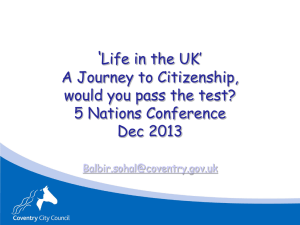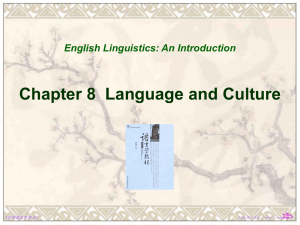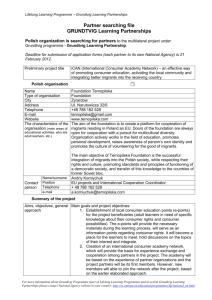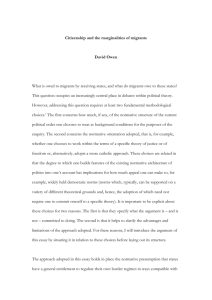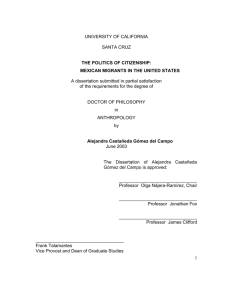FOCUS of the MLN This Grundtvig `network of networks` will address
advertisement
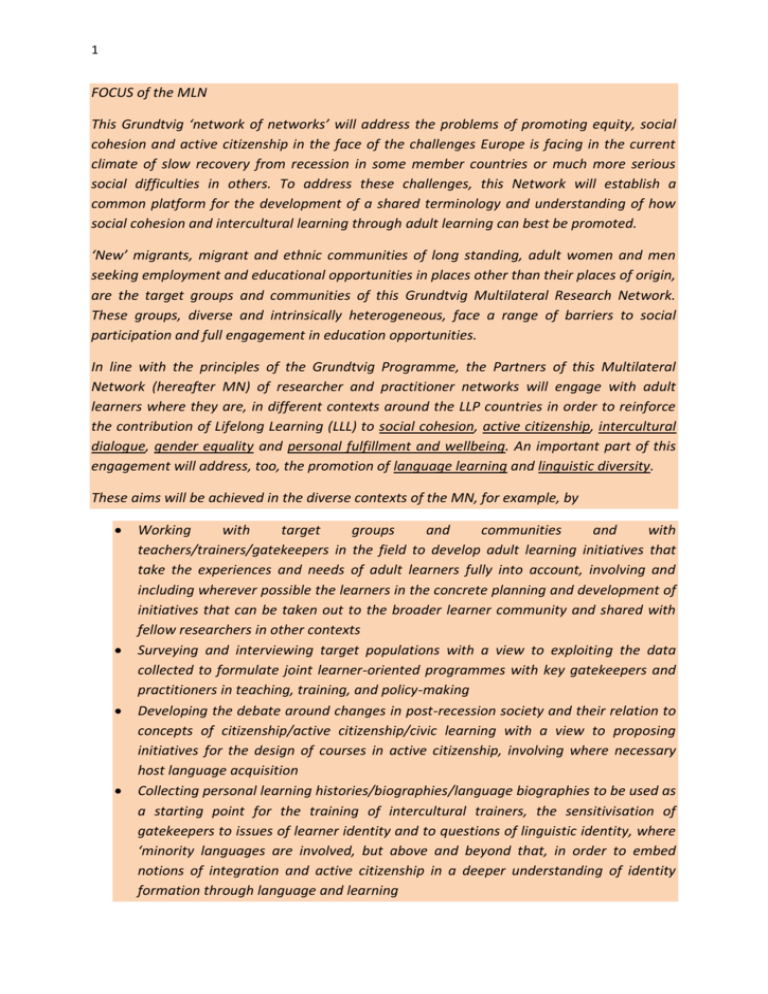
1 FOCUS of the MLN This Grundtvig ‘network of networks’ will address the problems of promoting equity, social cohesion and active citizenship in the face of the challenges Europe is facing in the current climate of slow recovery from recession in some member countries or much more serious social difficulties in others. To address these challenges, this Network will establish a common platform for the development of a shared terminology and understanding of how social cohesion and intercultural learning through adult learning can best be promoted. ‘New’ migrants, migrant and ethnic communities of long standing, adult women and men seeking employment and educational opportunities in places other than their places of origin, are the target groups and communities of this Grundtvig Multilateral Research Network. These groups, diverse and intrinsically heterogeneous, face a range of barriers to social participation and full engagement in education opportunities. In line with the principles of the Grundtvig Programme, the Partners of this Multilateral Network (hereafter MN) of researcher and practitioner networks will engage with adult learners where they are, in different contexts around the LLP countries in order to reinforce the contribution of Lifelong Learning (LLL) to social cohesion, active citizenship, intercultural dialogue, gender equality and personal fulfillment and wellbeing. An important part of this engagement will address, too, the promotion of language learning and linguistic diversity. These aims will be achieved in the diverse contexts of the MN, for example, by Working with target groups and communities and with teachers/trainers/gatekeepers in the field to develop adult learning initiatives that take the experiences and needs of adult learners fully into account, involving and including wherever possible the learners in the concrete planning and development of initiatives that can be taken out to the broader learner community and shared with fellow researchers in other contexts Surveying and interviewing target populations with a view to exploiting the data collected to formulate joint learner-oriented programmes with key gatekeepers and practitioners in teaching, training, and policy-making Developing the debate around changes in post-recession society and their relation to concepts of citizenship/active citizenship/civic learning with a view to proposing initiatives for the design of courses in active citizenship, involving where necessary host language acquisition Collecting personal learning histories/biographies/language biographies to be used as a starting point for the training of intercultural trainers, the sensitivisation of gatekeepers to issues of learner identity and to questions of linguistic identity, where ‘minority languages are involved, but above and beyond that, in order to embed notions of integration and active citizenship in a deeper understanding of identity formation through language and learning 2 The research communities of the Network will link up with practitioners and other key stakeholders working with adult learners, migrants and women in migrant and ethnic communities to ensure that research is grounded in practice and to enhance its impact on delivery and policy. Case studies, scientific papers and a Handbook of Intercultural Learning in Adult Education will highlight the role that different forms of learning can have in removing barriers between communities. Effective adult learning systems for the Network’s target groups will be developed in collaboration with the Associate partners. The products for dissemination will facilitate the transfer of good practice to practitioners in the field working towards social cohesion, integration and citizenship education and will have a decisive impact on policy decision-makers. A major challenge facing Europe in 2012 is how we understand diversity and how we learn to live as citizens in communities facing rapid social change. The Memorandum on Lifelong Learning (EC 2000) cited active citizenship and the need to ‘learn to live positively with cultural, ethnic and linguistic diversity’ as one of the joint aims of lifelong learning. Across Europe we work within very different adult educational systems and different migration regimes; each country faces its own particular challenges when it comes to promoting and developing social cohesion, access to learning for older or marginalized adults, integration and learning opportunities for migrant populations, including the ‘historic’ ethnic minorities, the ‘new’ migrants of the EU-27 and its neighbours, and the ‘new emigrants’ of the post-financial crisis situation. All of these groups are clearly diverse and internally heterogeneous, and they face a range of multiple and cross-cutting barriers to social participation and engagement in learning opportunities. All of them, in the context of the enlargement of the EU and after the first shocks of the 2008 financial crisis, as migrants, potential emigrants and marginalized women and men seeking work and access to education across borders and Europe-wide, are increasingly confronted by the need for intercultural learning opportunities and wider language acquisition possibilities, if they are to overcome the barriers dividing them from their fellow citizens, learners and workers in multilingual and multicultural life worlds. Given the obvious need to confront the increasingly fluid situation that is developing in Europe, where the economic crisis is altering the face of labour markets, is threatening education systems and is spurring the movement of people seeking work, security, qualifications and social rights in traditional directions, but also, increasingly, in new directions, there is a need to build on and share research and practice in order to generate a European wide understanding of how to develop both conceptual and practical solutions to the pressing social problem of nurturing solidarity and citizenship in the context of such diversity. This 'network of networks' will achieve this by establishing a common platform for the development of a shared terminology and understanding of how cohesion through adult learning can best be promoted. Linking research communities with practitioners and other key stakeholders will ensure that research is grounded in practice and will enhance its 3 impact on delivery and policy. Case studies, scientific papers and practice guides will highlight the role of different forms of learning in removing barriers between different communities. These products will promote the development of efficient and effective adult learning systems for target groups, while at the same time offering a needs-analysis. This is met through generating a shared understanding of the learning activities most likely to contribute to cohesive communities of citizens and overcome barriers to civic participation often experienced by different migrant groups, including the particular effects of such barriers on women and ethnic minorities. Conferences, seminars and the project website will promote best practice. Case studies will contribute to greater understanding of diversity and sources of intercultural learning. The project will identify how marginalized social groups achieve key competences and knowledge, including language and citizenship skills, through formal, non-formal and informal learning; it will identify gaps in pathways learning and promote the development of needs analysis in relation to the provision of adult education for this target group. Social and civic participation and language acquisition are key concerns for the social integration of adult learners on the move in Europe, with a particular focus on migrants and ethnic minorities. This priority will be addressed through research and analysis to identify learning systems most likely to promote these outcomes. The project is designed to raise awareness of the linguistic, social and cultural diversity of migrant communities in particular and to provide solutions to the paradox of recognising difference while promoting equality and integration. A key objective is to develop greater understanding of diversity and the learning systems which facilitate integration. Case studies and other outputs will highlight and promote intercultural dialogue and challenge prejudice and barriers to adult learning.
